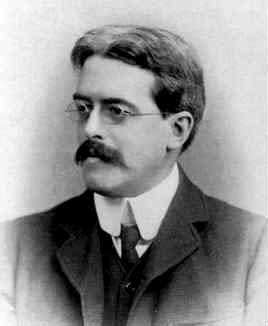


 تاريخ الرياضيات
تاريخ الرياضيات
 الرياضيات في الحضارات المختلفة
الرياضيات في الحضارات المختلفة 
 الرياضيات المتقطعة
الرياضيات المتقطعة
 الجبر
الجبر
 الهندسة
الهندسة 
 المعادلات التفاضلية و التكاملية
المعادلات التفاضلية و التكاملية 
 التحليل
التحليل
 علماء الرياضيات
علماء الرياضيات |
Read More
Date: 3-5-2017
Date: 3-5-2017
Date: 27-4-2017
|
Died: 24 August 1929 in Northampton, England

Thomas Bromwich's father, John l'Anson Bromwich (born Bridgenorth, Shropshire about 1843), was a woollen draper and his mother was Eliza Ann Cook (born Bridgenorth, Shropshire about 1853). Thomas was born at Queen's Square, Wolverhampton, and he began his schooling in that town before his parents emigrated to South Africa. He spent his youth in Natal, receiving his schooling at the High School in Durban from 1888 to 1892.
He returned to England to study at St John's College Cambridge arriving in 1892, in the same year as Whittaker. He obtained a Fellowship at St John's College in 1897 but left Cambridge to become professor of mathematics at Galway in 1902. He left Galway in 1907 and returned to a permanent post as College lecturer at St John's College, Cambridge.
During his tenure of the chair at Galway he was elected a Fellow of the Royal Society (1906). Throughout his career he was an active member of the London Mathematical Society, being Secretary from 1911 until 1919 when he was elected Vice-President.
Bromwich's first research was on applied mathematics where was influenced by Stokes. He made significant contributions to electromagnetism although he was always less interested in the physics, more in the mathematics. Some of this work is described in [6] where its history is explained:-
... T J I'A Bromwich's method for solving the source-free Maxwell equations for electromagnetic waves. ... was originally used by Bromwich in 1899, and subsequently independently discovered by H M Macdonald. It was first included as a question in Part II of the Mathematical Tripos in 1910 and featured by Bromwich in his lectures at Cambridge during the same year. He published this method in 1919, and it also formed the basis of his seminal paper on the scattering of plane electric waves by spheres.
Bromwich also made substantial contributions to pure mathematics. He worked on infinite series, particularly during his time in Galway. In 1908 he published his only large treatise An introduction to the theory of infinite series which was based on lectures on analysis he had given at Galway. Hardy said:-
The book is unquestionably a very fine one. It is not merely a good and an interesting book: it has a character and a distinction which show at once that it is written by an exceptional mathematician.
Bromwich also made useful contributions to quadratic and bilinear forms and many consider his algebraic work to be his finest. In 1906 he published Quadratic Forms and their Classification by Means of Invariant Factors. Gow [3] writes:-
This book is an early example in English of the more abstract methods introduced into algebra by researchers such as Kronecker and Weierstrass. It is particularly concerned with the simultaneous reduction of two quadratic forms, a problem which, in its modern presentation, requires almost the full repertoire of the theory of a single linear transformation.
In a series of papers he put Heaviside's calculus on a rigorous basis treating the operators as contour integrals.
Bromwich did his best work before reaching the age of 33, perhaps suffering because of overwork after this time. Hardy said, see [5] :-
He was engaged in original work in several different fields: he put a great deal of energy into his college and university lectures, where his passion for working out every detail must have added enormously to his labours: and to all this he added a considerable amount of examining and private coaching. ... He would have had a happier life, and been a greater mathematician, if his mind had worked with less precision.
The hard work which Bromwich put into his teaching certainly had a negative effect on his research, and perhaps, as Hardy suggests, on his happiness. But on the other hand it had a very positive effect on his teaching. This is clearly illustrated by the summing up of his years at Cambridge in [2]:-
For many years he was one of the best-known mathematical teachers at Cambridge, and his lectures and tuition were diligently attended by those aiming at high mathematical honours.
Unfortunately his health began to suffer through this hard work and he became afflicted by a mental disorder which eventually led to his suicide.
Hardy summed up Bromwich's contributions across a wide range of mathematical areas when he described him as the:-
... best pure mathematician among the applied mathematicians at Cambridge, and the best applied mathematician among the pure mathematicians.
He did make some slightly critical comments regarding Bromwich, however, describing him as "thinking vaguely" and "a little wanting in imagination".
Books:
2.R Gow, Some Galway professors of mathematics and natural philosophy, Irish Math. Soc. Bull. 35 (1995).
Articles:



|
|
|
|
دراسة: حفنة من الجوز يوميا تحميك من سرطان القولون
|
|
|
|
|
|
|
تنشيط أول مفاعل ملح منصهر يستعمل الثوريوم في العالم.. سباق "الأرنب والسلحفاة"
|
|
|
|
|
|
|
العتبة العباسية المقدسة تختتم فعّاليات النسخة الثامنة من المسابقة الوطنية لفنّ الخطابة
|
|
|